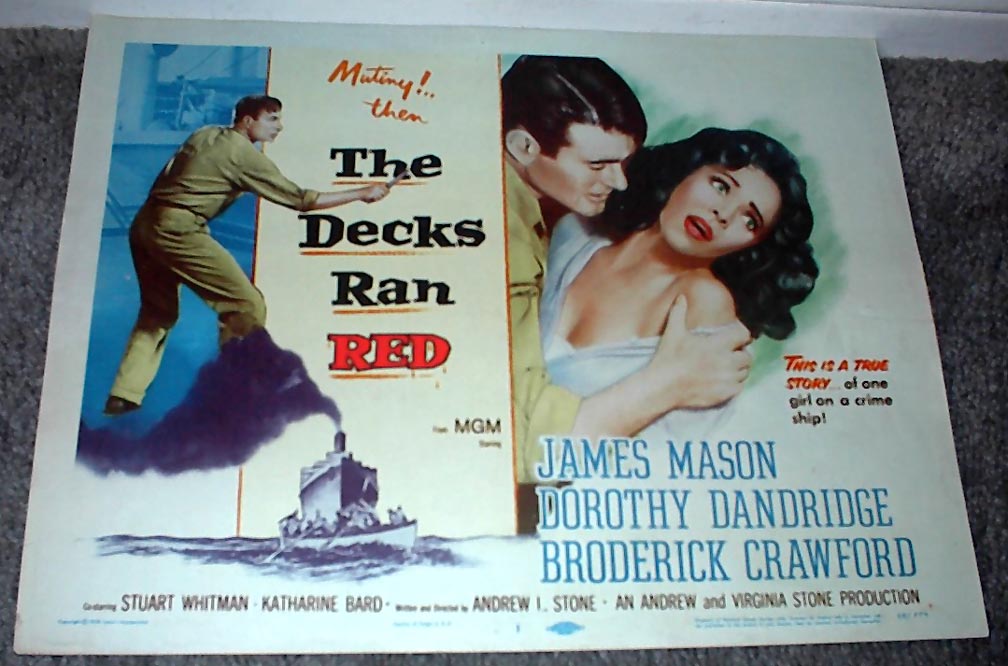
THE DECKS RAN RED
US, 1958, 84 minutes, Colour.
James Mason, Dorothy Dandridge, Broderick Crawford, Stuart Whitman, Jack Kruschen.
Directed by Andrew L. Stone.
The Decks Ran Red is a drama at sea – more of a heightened melodrama. James Mason is present as the captain of a ship, Dorothy Dandridge is the femme fatale and Broderick Crawford is something of a hero for the film. It is not quite as lurid as the advertising tag: “They murdered her man … and now she was at the mercy of the love-starved crew of the Berwind!”
The film was written and directed by Andrew L. Stone, a director whose films generally were very plain, not particularly well crafted, geared for a very undemanding audience. He had begun directing in 1927. One of his earliest films in the 1940s was the black American musical, Stormy Weather. During the 50s he made a number of thrillers including Julie with Doris Day and Cry Terror. His final films in the 1970s were the rather bland stories of Greig in Song of Norway and the Strausses in The Great Waltz.
1. The interest and appeal of this film, action, the Navy, the human interest, crime? How well were these ingredients blended?
2. The atmosphere of authenticity as regards the time, places, the ship? The importance of the ship seeming real?
3. How credible were the events in this film? The characters? The enormity of Scott's plan, the details over so many years, the mistakes made, the challenges, the way the plot was put into practice?
4. The importance of the narrative for the film? The fact that the captain was narrating it? The flashback technique and the focus sing on Scott before the credits? How important was it that the audience knew the satisfactory outcome because of the captain's narrative?
5. How credible a person and personality was Scott? How did the film focus on him as the villain? The details of his character, the incidents which revealed his character as well as how devious he was? What put the plan into his head? Why did he hope to achieve? His hypocrisy and good name with the authorities? The way that he stirred up unrest and yet covered his tracks? His deviousness, his cruelty and murder? Was it credible that he could wish to murder so many in cold blood? His confidence and yet he made mistakes? His not anticipating the crew's reaction correctly? His desperateness and ruthlessness? His forcing Martin to murder? The final almost success? Would he have really got away with it? Audience response to this kind of enormous crime and criminal?
6. The character of Martin in comparison with Scott? His support of Scott's plans? His participation in the murder of the other partner? His attitude towards Mahia? Helping Scott to stir up unrest? Clashing with the crew? Helping Scott to murder, helping him to victory? A victim of his own greed and lust?
7. The focus of the film on Captain Rummill? The contrast with Scott and Martin? Heroics yet the modest background? The tone of his narrative, his initial choice to go to the ship, his encounter with his wife and the decision making, the way that he arrived and exercised his command, his character as a leader, his intentions for success in the ship, his mistake in hiring the Maori cook and letting his wife come aboard, his reaction to the unrest, his admitting mistakes, his helping the crew to cope, his way of acting during Scott's takeover? Was his behaviour credible?
8. The importance of his response to Scott’s threatening Mahia? His heroism in letting the men go in the boat, the swim back, the man who drowned, climbing the rope, the fight with Martin, with Scott? Saving the boat, ramming the small boat?
9. The introduction of Mahia? How integral to the plot, her character, imposed on by Martin, her relationship with her husband. being used against the captain? Her helping him in the final fight? Her tricking Martin?
10. How well presented were the scenes of the mutiny, the discussion amongst the crew, the murders in the engine room, the siege of the men, the threat of ramming the boat at the end?
11. How perceptive was this film in its exploration of motivations and characters?